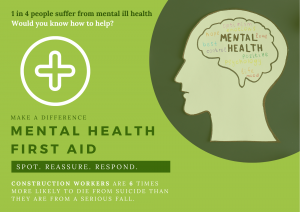Mental Health in the Construction Industry

It’s hard to find reliable data about mental health across industries, but one industry that’s consistently at the forefront, is the construction sector. Construction workers are six times more likely to die from suicide than from a serious fall.
Although discussions around mental health have entered the mainstream, there’s still residual stigma and most notably, fear. Fear that disclosing mental illness will ruin career prospects, or make the sufferer appear weak. This leads to many suffering in silence, feeling increasingly isolated. According to Construction News, 60 percent of people with a mental illness, waited more than a year before they told anyone.
The Chartered Institute of Building found that 26 percent of people working in the construction sector, had suicidal thoughts in 2019 and that 97 per cent reported feeling stressed in the past year. 70 percent of respondents suffered from depression, while 87 percent experienced anxiety. CIOB President, Professor Egbu, said lack of HR support, job insecurity and long hours, coupled with late payments and time away from families, had resulted in a silent crisis.
Most worrying, is the fact 56 percent of respondents worked for companies with no mental health policies. Things are likely to look far worse post-COVID.
So, if you’re working in the construction industry, what changes can you make to improve mental health?
Construction Industry Helpline offer a range of support services, including a free app, for those in immediate need. Looking ahead, it’s more important than ever for companies to introduce mental health policies and protocols.
Mental Health training is an obvious starting point, enabling companies to involve employees directly, through becoming Mental Health First Aiders. Over two days, course attendees learn to spot the signs of mental illness and respond on a first aid basis. It’s not a substitute for a professional diagnosis, but it can be vital to averting a crisis. It also sends a strong message to employees that the company is committed to supporting them through any mental health issues. Aside from fulfilling a duty of care, Mental Health First Aid training improves productivity, reducing absenteeism, staff turnover and presenteeism.
The next course is 17th-18th December. To find out more, or discuss alternative course dates, email bonita@bnshe.co.uk or visit our page on Mental Health First Aid.
Clive IllingworthSHEA ManagerEssential Fleet Services
"BN SHE Consultancy Ltd were, up until December 2015, assisting our company through various business changes. As the Health & Safety Manager for the company I have found both Bonita and Neil extremely professional in not only dealing with our internal sites and depots, but also our external customers when required. Their meticulous approach when dealing within specific criteria for vehicle repair workshops is second to none. With their proactive approach in dealing with problems, identified as part of the audit process, they were able to assist our staff with on the spot advice on how to rectify the issue/problem; this pragmatic approach and attitude helped make the whole auditing process work extremely well."
Katie ShooterManagerAesthetiCare & Ferndale Pharmaceuticals Ltd
"Health and Safety is no longer something to be scared of in our company. We have been working with BN SHE Consultancy Ltd for over a year now, and this has just become a part of our daily routine. BN SHE always ensure we are fully compliant with Health and Safety regulations, and that we have the correct Risk Assessments in place which fall in line with business change. I would highly recommend BN SHE Consultancy Ltd."
Joe Reynolds Operations DirectorAK Industries
"BN SHE were approached to form part of our HSE support network and aid AKI with our Health & Safety (ISO 45001) and Environmental (ISO 14001) certification. Not only did BN SHE support with the development and implementation of a new integrated HSE management system but they proved invaluable in skilling up internal staff and worked directly with the external accreditation body during the initial audits, making them both pain and non-conformance free. BN SHE currently form part of our health & safety committee and provide invaluable direct day to day support for all our HSE needs. In summary BN SHE have helped remove the fog of confusion around HSE and made it something AKI are now proud of."
Ciprian OstafiePlanning and Compliance ManagerEncompass Environmental Ltd
"Here at Encompass Environmental Ltd, we were looking for a consultancy to assist with our management system to obtain ISO Certifications. BN SHE was recommended to us, and we are so pleased that we got the help and support of Neil and his team – we couldn’t have asked for more. In a very professional, efficient, and cost-effective way, Neil and the team have assisted us to set up our Integrated Management System and obtain the ISO 9001:2015, ISO 14001:2015 and ISO 45001:2018 Certifications. And not only that, the Integrated Management System that has been set up by them also meets the requirements of RISQS. We would like to take this opportunity to say thank you for all the help and support throughout this process and to any organisation out there that is looking for consultancy within Health and Safety and Management Systems, we believe, without a shadow of a doubt that BN SHE Consultancy Ltd is the company to steer you in the right direction."
Dr. Noel JohnCompliance Director LCI Rail
"We enlisted BNSHE to implement an integrated management system during 2018 that would be in compliance with ISO 9001, 14001 & 45001. This project was to be from start to finish and they should also attend the ISO certification audit (UKAS). We worked with both Neil and Bonny at times during this project which was seamless from beginning to end. Neil even managed to cross reference and signpost to existing processes required for our Rail RISQS compliance. We started in April and by September we were a certificated organisation. I have no hesitation in recommending the BNSHE team to any organisation who is looking for someone who delivers on what they promise they are just brilliant!"
Beverley HeathMooD Account ManagerCACI Ltd (Information Intelligence Group)
"Neil supplied us with the technical expertise, business acumen, and encouragement to achieve what we knew to be a challenge: achieving ISO 45001 certification in less than 2 months. At the time we brought Neil, and his company BNSHE, in to advise us, our organisation was very comfortable with the people aspects of Occupational Health and Safety (OH&S). The technical side, the understanding of the ISO standard, and the minute level of detail needed to evidence the wider OH&S landscape, was new territory for us. Neil quickly absorbed information on the essence of our core business and tailored a package of policies, procedures, registers and forms that filled any gaps left by our company's other documents. This ensured we had every clause of the ISO standard covered by a cohesive OH&S Management System that was relevant to us, and therefore would not be simply "shelf ware". As our internal auditor, Neil was rigorous in seeking out non-conformities and opportunities for improvement and put us on a sound footing for the audits that followed rapidly. The service Neil offers in continued support and advice, and provision of tailored OH&S updates, is important to help us maintain a strong OH&S system and we have happily contracted with BNSHE for this. Neil's patience, calmness and good humour were reassuring at all times and we very much enjoyed working with him. We are very grateful to Neil for what he has helped us achieve: in fact we are not at all sure we could have done this without him."
Mike Wilding DirectorDT Contracting (SW) Ltd
"After many years working with a multitude of consultants negotiating the myriad of compliance accreditations necessary to operate within the highly regulated construction industry we were fortunate to be introduced to BN SHE Consultancy Ltd. In a relatively short time Bonny and Neil have streamlined and updated all our internal SHEQ systems resulting in our ISO9001:2015 certification being achieved in less than a year. We are currently working towards ISO14001 and ISO45001 with the full guidance of BN SHE Consultancy Ltd, who also provide us with effective ongoing support in maintaining our SSIP and RISQS accreditations. The service extends to regular site audits and clear, objective reviews of our contract documentation in relation to SHEQ. Above all the support our team receives is always proactive and entirely professional, giving us an extra level of confidence in our day to day operations in what can still be very much a high risk industry. We would have no hesitation in recommending BH SHE Consultancy Ltd to other companies within the industry"
Michael Cirstean Managing Director Dynamic Group Limited
"Dynamic Group were looking for a company to help us with an integrated management system; ISO 9001, 14001 AND 45001 that would incorporate our rail management system to give us a solution for the whole business. We were referred to BN SHE and Neil was assigned to us to review our current systems. As soon as we were able to present to Neil our audit results he attended our offices and put together an action plan to adopt all the necessary processes and procedures required for us to reach the acquired standard. The speed in which Neil put our systems together is testament to the great service they provide. We gave them a narrow window within which we wanted to achieve these standards and working management system and they certainly delivered with time to spare. To help us through the process Neil often dealt with enquiries outside of office hours and this still further helped with a smoother process. Very professional at all times and highly recommended. Thank you to the BN SHE Team "
Luke WellingsManagerTrueline Expanded Products Ltd
"Trueline got in touch with BN SHE following a visit from the HSE in which an improvement notice was issued. In order for us to comply with health and safety legislation we needed a fully compliant health and safety management system that was not only comprehensive and effective but enforced and communicated to employees. BN SHE immediately identified what we needed at Trueline and designed a bespoke action plan to achieve results in a short period of time. Not only was an action plan created but Bonita created all policies and procedures we needed to become compliant and made sure I was involved at every stage so I could understand and enforce our new system. The service BN SHE provided was extremely professional and we could not have been any happier, not only did our health and safety culture improve but Bonita gave me the confidence and knowledge to continue to improve the health and safety of our employees."
Megan McHaleCompliance ManagerFlatley Construction Limited
"We worked closely with BN SHE Consultancy Ltd, to implement an integrated management system; IS0 9001, 14001 & 45001. After getting to know our business, BN SHE produced a system which is reflective of us as a company, easy to understand and therefore easy to implement. We would like to thank Neil and the team at BN SHE for being available evenings and weekends to answer any questions we had leading up to our audits. We would also like to thank them for helping us become an ISO certified business, which will allow us to tender for further work in the future."
View Testimonials






